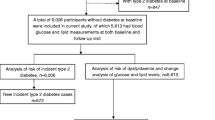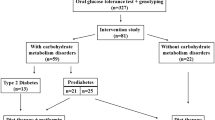Abstract
Type 2 diabetes mellitus (T2DM) is characterized by impaired insulin secretion, peripheral insulin resistance, and increased hepatic glucose production. Genes that contribute to genetic susceptibility to T2DM function in numerous biochemical pathways. Uncoupling protein-2 (UCP2) functions as a negative regulator of insulin secretion. Animal studies show induction of UCP2 plays a pathogenic role in the progression of obesity-induced T2DM and some human studies have shown an association between a common UCP2 polymorphism, Ala55Val (rs660339), and T2DM, obesity, and resting metabolic rate with the Val/Val genotype conferring increased risk. We investigated the relationship between the Ala55Val variant and incidence of T2DM among 12,056 participants in the Atherosclerosis Risk in Communities (ARIC) Study aged 45–64 years at baseline. Incident T2DM (n = 1,406) cases were identified over 9 years of follow-up. The Val55 allele frequency was 44% in blacks and 41% in whites. The rate of T2DM per 1,000 person was 15.0, 15.6, and 15.6 yearsfor Ala/Ala, Ala/Val, and Val/Val genotypes, respectively. We found no significant association between UCP2 genotypes and incident T2DM in the whole cohort, in race-gender subgroups, or in categories of body mass index (normal, overweight and obese). The Ala55Val polymorphism of UCP2 was not associated with incident T2DM in the ARIC cohort.
Similar content being viewed by others
References
Krauss S et al (2003) Superoxide-mediated activation of uncoupling protein 2 causes pancreatic beta cell dysfunction. J Clin Invest 112(12):1831–1842
Duarte NL et al (2003) A 45-bp insertion/deletion polymorphism of uncoupling protein 2 in relation to obesity in Tongans. Obes Res 11(4):512–517
Wang H et al (2004) Uncoupling protein-2 polymorphisms in type 2 diabetes, obesity, and insulin secretion. Am J Physiol Endocrinol Metab 286(1):E1–7
Yu X et al (2005) The uncoupling protein 2 Ala55Val polymorphism is associated with diabetes mellitus: the CARDIA study. Clin Chem 51(8):1451–1456
The Atherosclerosis Risk in Communities (ARIC) Study: design and objectives. The ARIC investigators. Am J Epidemiol, 1989129(4):687–702
Berraondo B et al (2000) Up-regulation of muscle UCP2 gene expression by a new beta3-adrenoceptor agonist, trecadrine, in obese (cafeteria) rodents, but down-regulation in lean animals. Int J Obes Relat Metab Disord 24(2):156–163
Argyropoulos G et al ((1998)) Structure and organization of the human uncoupling protein 2 gene and identification of a common biallelic variant in Caucasian and African–American subjects. Diabetes 47(4):685–687
Krempler F et al (2002) A functional polymorphism in the promoter of UCP2 enhances obesity risk but reduces type 2 diabetes risk in obese middle-aged humans. Diabetes 51(11):3331–3335
Gable DR et al (2006) Variation in the UCP2–UCP3 gene cluster predicts the development of type 2 diabetes in healthy middle-aged men. Diabetes 55(5):1504–1511
Kovacs P et al (2005) Genetic variation in UCP2 (uncoupling protein-2) is associated with energy metabolism in Pima Indians. Diabetologia 48:2292–2295
Acknowledgments
We are grateful for resources from the NIH Training Grant in Cardiovascular Disease Genetic Epidemiology (T32-HL007972). The ARIC Study is carried out as a collaborative study supported by National Heart, Lung, and Blood Institute contracts N01-HC-55015, N01-HC-55016, N01-HC-55018, N01-HC-55019, N01-HC-55020, N01-HC-55021, and N01-HC-55022. The authors thank the staff and participants of the ARIC study for their important contributions.
Author information
Authors and Affiliations
Corresponding author
Rights and permissions
About this article
Cite this article
Bielinski, S.J., Pankow, J.S., Boerwinkle, E. et al. Lack of association between uncoupling protein-2 Ala55Val polymorphism and incident diabetes in the atherosclerosis risk in communities study . Acta Diabetol 45, 179–182 (2008). https://doi.org/10.1007/s00592-008-0039-6
Received:
Accepted:
Published:
Issue Date:
DOI: https://doi.org/10.1007/s00592-008-0039-6




